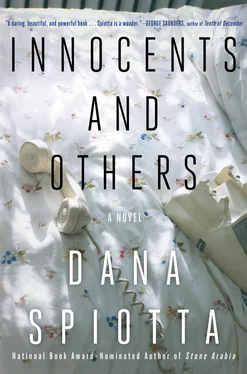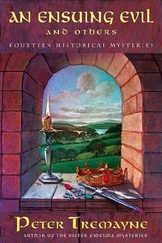She should leave. She didn’t want to be lurking around there when the woman came out. Her hand trembled as she inserted the key. She felt so giddy — almost high. She breathed in deeply. Wow. But leave now.
Meadow turned the key and started the car, felt the blast of the heat and the radio. She lowered the volume. She felt different now than she had before. Ridiculous, as if she could change. She clipped her safety belt. She felt for her wallet, her gum, and her phone. She backed out.
Meadow remembered an article she had cut out of the paper about Zell Kravinsky. When she got to her studio, she went through her files until she found it. “An Organ Donor’s Generosity Raises Question of How Much Is too Much.” Zell was a millionaire who one day began to give away all his money except for a modest house. Why should he have extra when others didn’t have enough? That was a very simple question. Then he went even further, why should he have two kidneys when some people were waiting for transplants? So he gave one away to a stranger. The article speculated that his generosity was some kind of pathology, a mental illness. His generosity was so extreme that it was almost grotesque to the writer, and presumably to a reasonable reader. But what Meadow admired was that it wasn’t emotional — it was moral logic, duty, a deliberateness on Zell’s part about doing good rather than harm.
How to be good? Maybe she would never be a good person. But she could do good things. Meadow would not give away a kidney, but she could change her life. It was quite clear. Rearrange it until it was a net good.
Money, for starters. She always had more than most people, but what good was it?
She talked to her father, and with the trust fund he had given her, she arranged to buy a tiny house on a small piece of property in the green hills between Gloversville and Albany. It was a perfectly intact nineteenth-century saltbox, with a fireplace and only eight hundred square feet of living space. All she would have to pay were the taxes. She got rid of her place in Washington Heights. She got rid of the warehouse studio. All of the remaining money from the trust would go to causes she identified. One of the biggest donations was given to the Justice Campaign.
She felt liberated. The further she went, the simpler it became. Slowly she sold off her belongings so she could give away more money. She wore thrift store clothes; she stopped eating meat. She got her expenses down to a minuscule amount. She liked how this felt, but she didn’t let it go too far. She did not starve herself or swear off all bodily pleasures. She kept her DVDs and her books. She took measure of herself. She would not become like Kateri Tekakwitha, the Lily of the Mohawks. She wouldn’t let herself go to an extreme in which deprivation became its own excess.
Carrie occasionally called, and Meadow was cryptic about her life. But eventually Meadow told her what she had been up to.
Without hesitation, Carrie said, “Sell the house. Sell the car. Sell the kids. Find someone else. Forget it. I’m never coming back. Forget it!” This from Apocalypse Now. They both laughed. “You have pulled a Kurtz.”
“Kurtz doesn’t say that, you know,” Meadow said. “It is a recording of Lieutenant Colby.”
“I know, I know,” Carrie said. “But everyone remembers it as Kurtz.” There was a pause. “But you are okay, right?”
“I’m trying,” Meadow said.
Was it possible to be truly humble? No, but she could tread lightly, quietly.
What did she have to give? What was hers to give?
She adopted two dogs from an animal shelter. She volunteered her time. At a women’s clinic for underserved communities. At a literacy center for adults. At a group for environmental advocacy. She didn’t have any particularly useful skills, so she mostly made phone calls and asked people for money. She knew that for things to get truly better, systematic change was needed, not charity and gestures. But she urged herself to do whatever small good she could think of, right now. It made her life tolerable, and she could sleep at night.
* * *
After three years of this penitent life, Meadow decided to take a job teaching film at a college in Albany. It was a BFA program, and she was a professor of practice. She didn’t care to teach filmmaking, but they let her teach film studies. Film studies classes for filmmakers, not academics.
Meadow taught whatever films she wanted to study. It was like being twenty all over again. Her first semester she taught a class devoted to film noir in its weirdest permutations. Of course she taught nonfiction film. Then she taught the European New Wave, with a focus on the lesser-known films. But her favorite thing to teach was the Orson Welles section of her Innovators class. Welles was considered obvious and overrated by her students. She liked to show them exactly why he was her favorite. When it worked, when they understood that, and when she got them excited, she knew this also was a good thing.
Jack called her number one night and left a message on her voice mail.
He was so goddamned sick of the well-wishers and the care-givers. He just wanted to sit with his hound dog Sandy and look at the beach. He didn’t want to hear any more about options and palliatives and comfort.
Sandy was a perfect comfort: she was the same as she had always been. Sandy expected him to walk and feed her. She lay sleepily on the couch next to him, her chin resting on his leg. Everyone else was either talking about the illness or not talking about the illness but still thinking about it. His daughter winced when he lit a cigarette or made a drink, even though his diagnosis had nothing to do with these vices. What for, all this concern, when it was a fait accompli?
On a whim, he realized he wanted to talk to someone who didn’t know his prognosis, just knew him, and then he realized he would like to talk to Nicole.
After their disastrous meeting, and the film’s release, he thought he was finally over her. She had left two voice-mail messages for him, apologetic messages, one right after the film was shot and one a few months after that, but he never called her back.
He felt different now, less wounded. Leave it to a fatal disease to make you feel healed. She called him back, and they talked like old times. He didn’t tell her he was dying. But he did tell her some stories, and he played some music for her. She told him what she thought, and she was as kind and brilliant as ever. They were back to talking on the phone every day now. They discussed the movies they had watched, just as they had before, and sometimes she even told him about her life, her real life.
CARRIE GOES TO THE MOVIES
Rehearsal is going super long. I’m really, really sorry, but can you go without me?
Her son, Dash, texted her in complete sentences with punctuation. It was condescending, mom-texting, the equivalent of speaking really slowly to an old person. She wanted to text back:
but we ALWAYS go 2 a movie on Dec 26!!
They were going to see Manformers , a big action blockbuster, which was also part of the tradition, seeing a big cheeseball of a movie. Instead she texted:
no worries! c u later
She actually didn’t want to see Manformers , not at all. She did feel like seeing a movie, though. The Film Forum was showing a restored print of Vera Chytilová’s Daisies , a film she had heard about but never seen. Meadow had emailed her about it earlier in the week. Just a link and a sentence that said, “One day only to see this on the big screen. Want to go?” Carrie was amused that Meadow still used “on the big screen” as an incentive. Nobody gave a crap about big screens anymore. Besides, Carrie owned the Blu-Ray Criterion Collection Daisies DVD and could watch it on a pretty big screen in the comfort of her home anytime she wanted to, although she hadn’t gotten around to it yet. She had written back that she would love to go, but it was her movie tradition to go to a blockbuster with her son on the day after Christmas. She also said she hoped to see Meadow soon for dinner or lunch. It was the first time Carrie had heard from her since she put her essay online. She had no idea if Meadow had read it — but of course she must have.
Читать дальше












